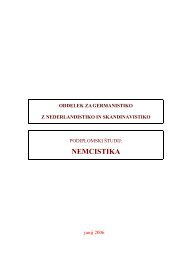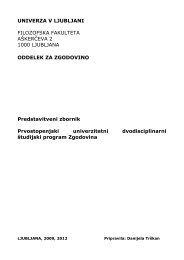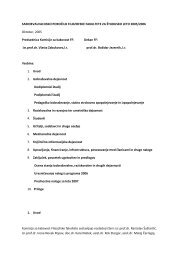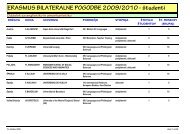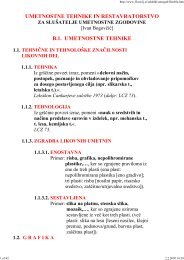POVZETEK Diplomsko delo se ukvarja s preu?evanjem delovne ...
POVZETEK Diplomsko delo se ukvarja s preu?evanjem delovne ...
POVZETEK Diplomsko delo se ukvarja s preu?evanjem delovne ...
You also want an ePaper? Increase the reach of your titles
YUMPU automatically turns print PDFs into web optimized ePapers that Google loves.
ABSTRACT<br />
The main topic of this diploma thesis is an investigation of the concept of work <strong>se</strong>lfefficacy<br />
and comparison of factor (factor-analytical) and facet (facet-theoretical)<br />
re<strong>se</strong>arch approaches. The investigation of work <strong>se</strong>lf-efficacy is ba<strong>se</strong>d on the<br />
assumption that belief in one's own efficacy is an important determinant of behavior.<br />
The paper is divided into three parts: theoretical, methodological and practical.<br />
In the theoretical part, an overview of general theory of <strong>se</strong>lf-efficacy and related<br />
empirical studies is given. The usage of the concept of <strong>se</strong>lf-efficacy within<br />
organizational psychology is demonstrated. Finally, a theoretical model of work <strong>se</strong>lfefficacy<br />
is pre<strong>se</strong>nted, which defines work <strong>se</strong>lf-efficacy as belief in one’s capability of<br />
organizing and executing behavior, which is necessary for successful coping with<br />
demands of specific working tasks or business behaviors.<br />
The methodological part is focu<strong>se</strong>d on the examination of a theoretical model of<br />
work <strong>se</strong>lf-efficacy. It deals with the investigation of the construct and predictive<br />
validity of the work <strong>se</strong>lf-efficacy model and also with the comparison of factor and<br />
facet approaches to theory testing and questionnaire construction. For this purpo<strong>se</strong>,<br />
three different questionnaires of work <strong>se</strong>lf-efficacy were constructed and tested on<br />
university students (N=433). Empirical analysis confirms three basic determinants of<br />
work <strong>se</strong>lf-efficacy: (1) reference context (whether the individual works alone or in a<br />
group), (2) task type (whether the individual's work is in relation to data, to people or<br />
to things) and (3) properties of working situation (whether or not the individual is<br />
expo<strong>se</strong>d to difficult working conditions such as work overload, ab<strong>se</strong>nce of structure<br />
or ab<strong>se</strong>nce of knowledge). Analysis of predictive validity reveals that especially <strong>se</strong>lfefficacy<br />
for working with data is significantly correlated with high school and<br />
undergraduate success. Comparison between factor and facet approaches on the<br />
other hand reveals benefits and shortcomings of both approaches. They are similar<br />
in their purpo<strong>se</strong> and goal, but differ in their focus on theoretical foundations, in items<br />
construction, in analysis assumptions, and in their interpretation and pre<strong>se</strong>ntation of<br />
results. Results of both approaches are to some extent similar.<br />
Finally, the practical part deals with construction of a specific questionnaire of work<br />
<strong>se</strong>lf-efficacy, that is: the questionnaire of <strong>se</strong>lf-efficacy for managerial behaviors<br />
(named Managerial Behavior Questionnaire). It was tested on a sample of<br />
employees from six Slovenian companies (N=76). The construction of the<br />
questionnaire demonstrates the applicative value of the general model of work <strong>se</strong>lfefficacy,<br />
which was constructed in theoretical part and confirmed in the<br />
methodological part of the thesis. The constructed questionnaire displays good<br />
psychometric properties and <strong>se</strong>ems applicative in companies. Importantly, <strong>se</strong>lfefficacy<br />
for managerial behavior is found to be significantly correlated with work<br />
satisfaction, burnout and ab<strong>se</strong>nteeism.






